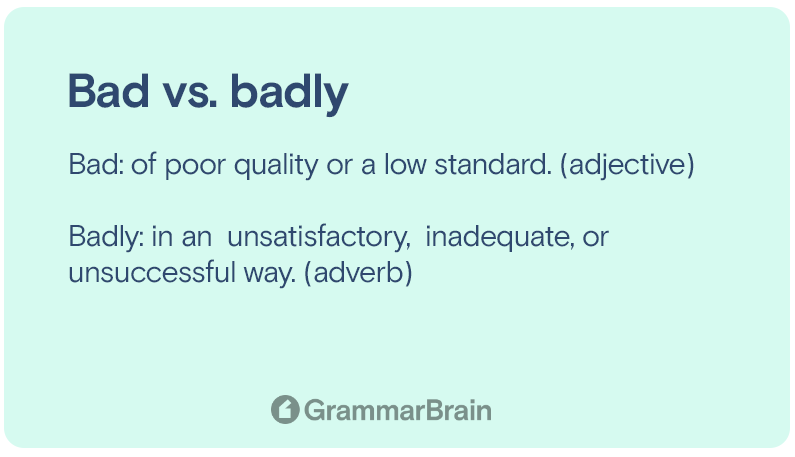Is it “bad” or “badly?” Do you ever wonder if you’re using the right word? Is it bad or badly? It might seem like a small detail, but getting this one wrong can change your sentence’s meaning and of course, the way you speak.
So, let’s find out how to use these words correctly and make sure your grammar is on point with some examples to help you along the way.

Bad vs. Badly – What’s the Difference
When it comes to the words “bad” and “badly,” it can be easy to use them incorrectly in a sentence. But with just a little knowledge, you can confidently use these words appropriately without any mishap.
“Bad” is an adjective that should be used to describe nouns and pronouns. On the other hand, “badly” functions as an adverb and should be used to modify verbs. Adverbs are usually misplaced when people use linking verbs, like “to be” and “to feel.”
So if a person had tripped and hurt their knees, they would say, “I feel bad,” because their injury is the subject of the sentence. However, if they had tried to play basketball but kept missing the ball, they would say, “I played badly.”
Pay attention to whether you’re describing a noun or how something was done, and let that guide your word choice. And don’t worry if you make mistakes; even native English speakers mess it up sometimes.
For instance, instead of saying, “I feel badly,” one could say, “I feel bad.” Learning this difference will bring peace of mind and make your writing shine even brighter.
| Word | Definition |
| Bad (adjective) | of poor quality or a low standard. |
| Badly (adverb) | in an unsatisfactory, inadequate, or unsuccessful way. |
Examples of how “bad” can be used as an adjective.
- He’s a bad boy.
- Your Spanish isn’t so bad.
- She’s a bad girl.
- They’re bad people.
- This is a bad situation.
- It’s a bad idea.
- I feel bad about what I said the other day.
- The house is in bad condition after the earthquake.
- I got a bad report card.
Examples of how “badly” can be used in a sentence.
- I feel so badly for her.
- He’s been acting so badly lately.
- I can’t believe she would say that so badly.
- This party is going so badly.
- Sam did badly on the test.
Tips to help you remember which word to use in what context
Generally, use “bad” when you’re talking about something that’s harmful or undesirable. Use “badly” when you’re describing how something was done wrong or wasn’t done well.
Here are 5 quick tips to help you remember the difference between these two:
- Think of the word “bad” as meaning “not good.”
- Remember that “ly” is always used to modify a verb. So if you want to say something was not done well, use the word “badly.”
- To help you remember the difference between these two words easily, think about the phrase “healthily eat.” This will give you the proper meaning of how to use it in different contexts.
In summary
‘Bad’ is an adjective used to describe people or things. It can also be used as a noun, meaning evil or the opposite of good.
Meanwhile, ‘badly’ is an adverb generally referring to the level of ability with which something is done.
So, if you want to say that someone did something very poorly, you could use the word ‘badly.’
I hope you got to know the difference between these two words with this short guide.
FAQs
Is it “I feel bad” or “I feel badly?”
Both are correct, given the context of the sentence. For example, “I feel badly about not being able to make the baseball game.” Or, “I feel bad about the way that I acted the other night.”
Is it “I need bad” or “I need badly?”
Most commonly, it will be “I need badly.” For example, “I need badly to find a job.”
Is it “feeling bad” or ” feeling badly?”
Very similar to “feel bad” and “feel badly,” both phrases are correct given the context of the sentence. For example, “I am feeling bad about that.” Or “I am feeling badly about the situation.”
Inside this article
Fact checked:
Content is rigorously reviewed by a team of qualified and experienced fact checkers. Fact checkers review articles for factual accuracy, relevance, and timeliness. Learn more.
Core lessons
Glossary
- Abstract Noun
- Accusative Case
- Anecdote
- Antonym
- Active Sentence
- Adverb
- Adjective
- Allegory
- Alliteration
- Adjective Clause
- Adjective Phrase
- Ampersand
- Anastrophe
- Adverbial Clause
- Appositive Phrase
- Clause
- Compound Adjective
- Complex Sentence
- Compound Words
- Compound Predicate
- Common Noun
- Comparative Adjective
- Comparative and Superlative
- Compound Noun
- Compound Subject
- Compound Sentence
- Copular Verb
- Collective Noun
- Colloquialism
- Conciseness
- Consonance
- Conditional
- Concrete Noun
- Conjunction
- Conjugation
- Conditional Sentence
- Comma Splice
- Correlative Conjunction
- Coordinating Conjunction
- Coordinate Adjective
- Cumulative Adjective
- Dative Case
- Determiner
- Declarative Sentence
- Declarative Statement
- Direct Object Pronoun
- Direct Object
- Diction
- Diphthong
- Dangling Modifier
- Demonstrative Pronoun
- Demonstrative Adjective
- Direct Characterization
- Definite Article
- Doublespeak
- False Dilemma Fallacy
- Future Perfect Progressive
- Future Simple
- Future Perfect Continuous
- Future Perfect
- First Conditional
- Irregular Adjective
- Irregular Verb
- Imperative Sentence
- Indefinite Article
- Intransitive Verb
- Introductory Phrase
- Indefinite Pronoun
- Indirect Characterization
- Interrogative Sentence
- Intensive Pronoun
- Inanimate Object
- Indefinite Tense
- Infinitive Phrase
- Interjection
- Intensifier
- Infinitive
- Indicative Mood
- Participle
- Parallelism
- Prepositional Phrase
- Past Simple Tense
- Past Continuous Tense
- Past Perfect Tense
- Past Progressive Tense
- Present Simple Tense
- Present Perfect Tense
- Personal Pronoun
- Personification
- Persuasive Writing
- Parallel Structure
- Phrasal Verb
- Predicate Adjective
- Predicate Nominative
- Phonetic Language
- Plural Noun
- Punctuation
- Punctuation Marks
- Preposition
- Preposition of Place
- Parts of Speech
- Possessive Adjective
- Possessive Determiner
- Possessive Case
- Possessive Noun
- Proper Adjective
- Proper Noun
- Present Participle
- Prefix
- Predicate



